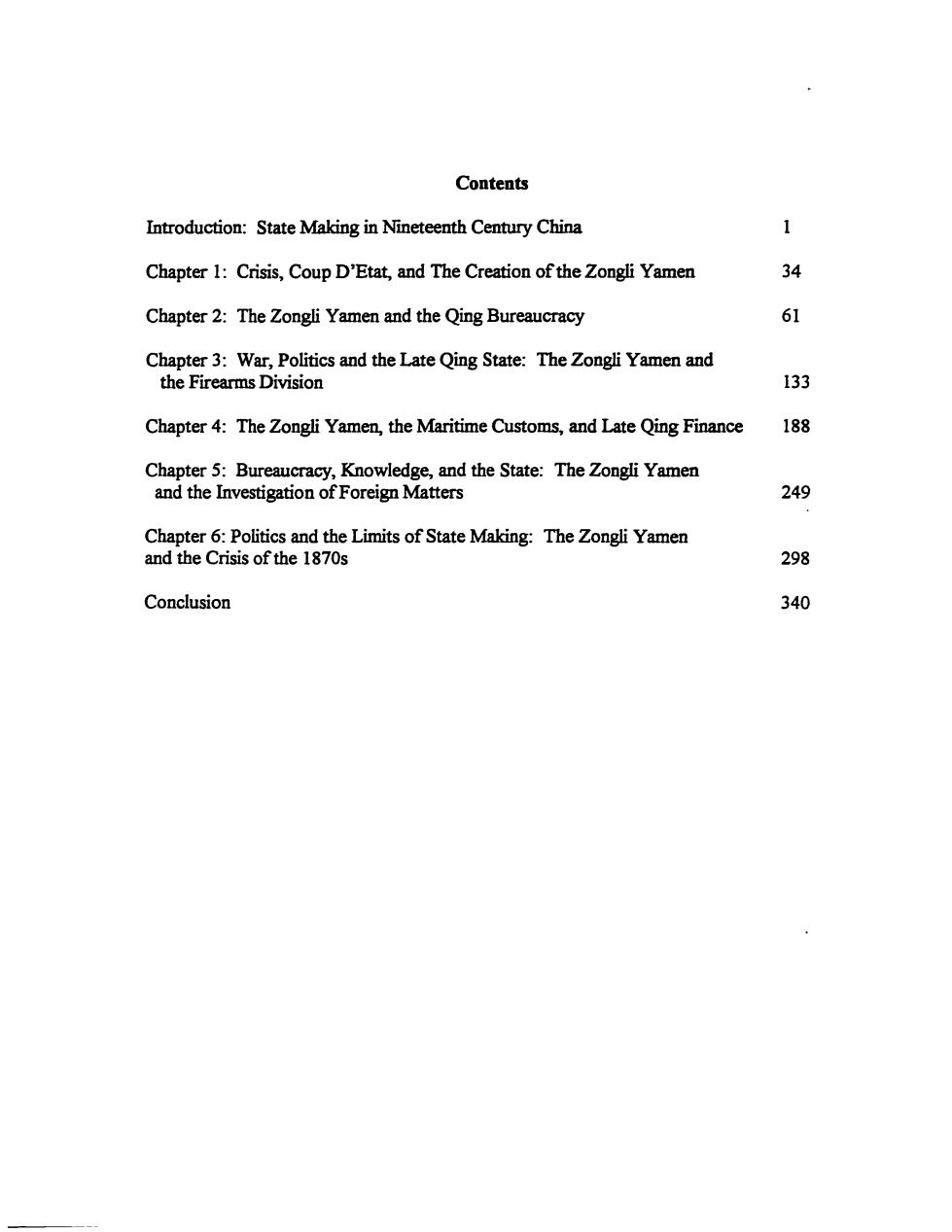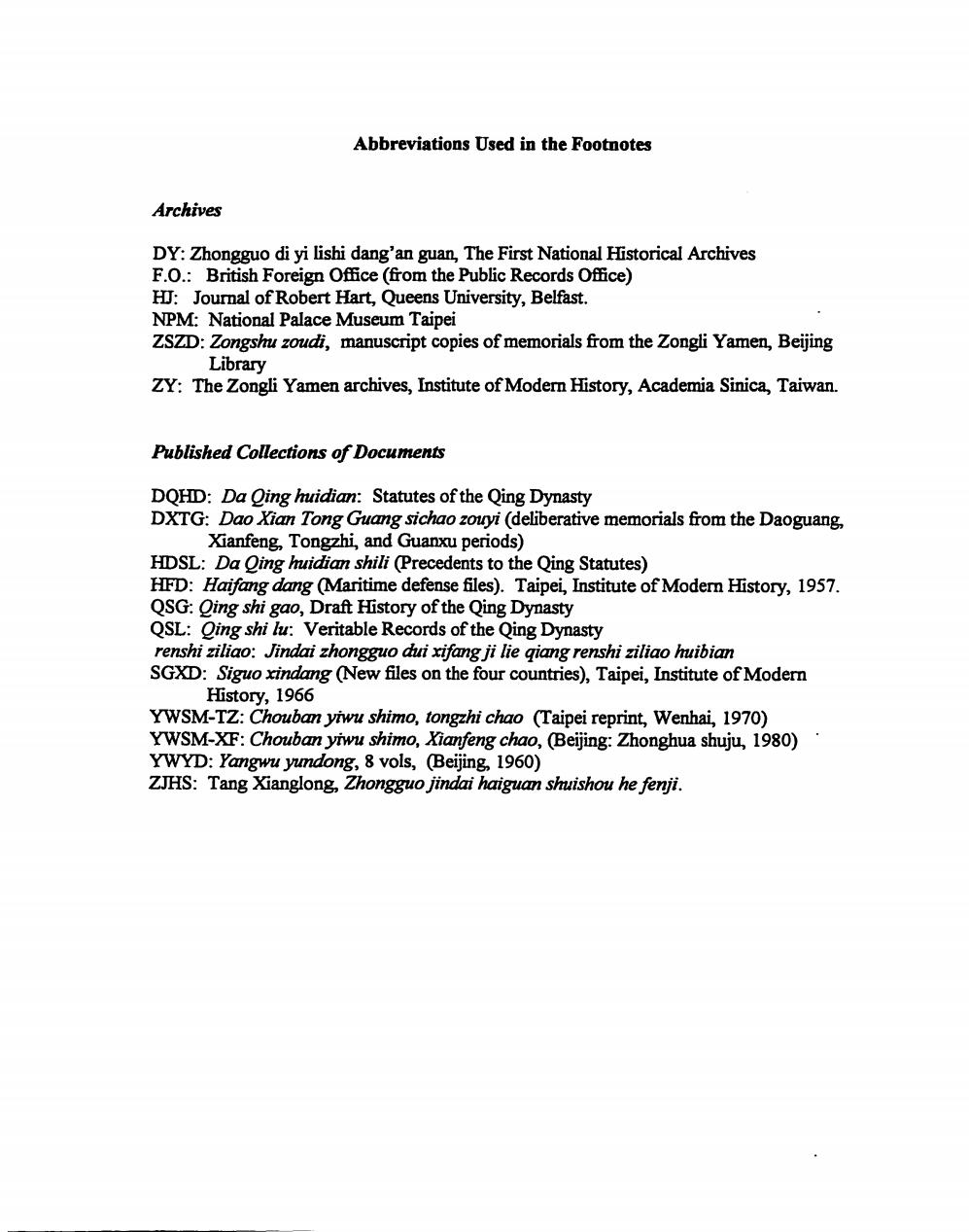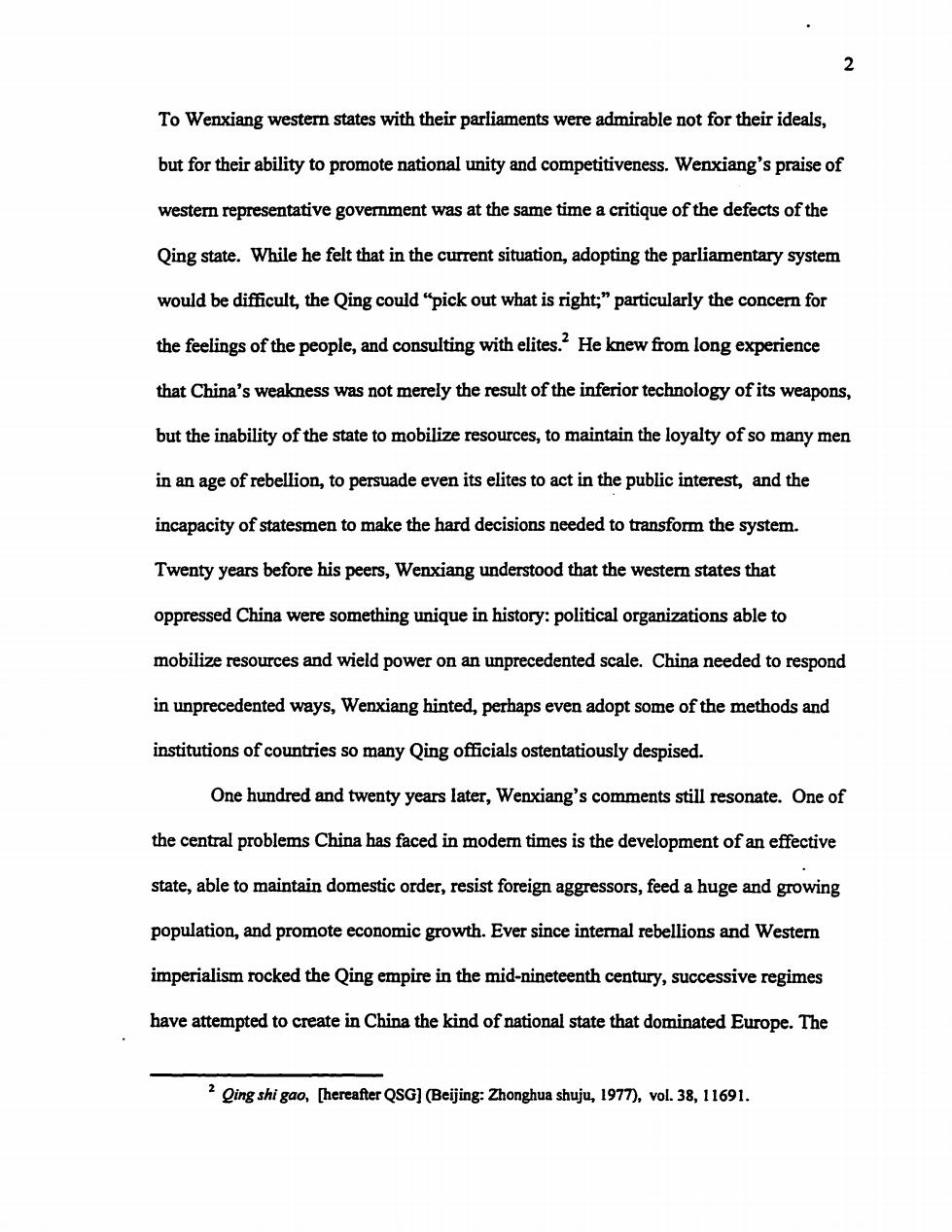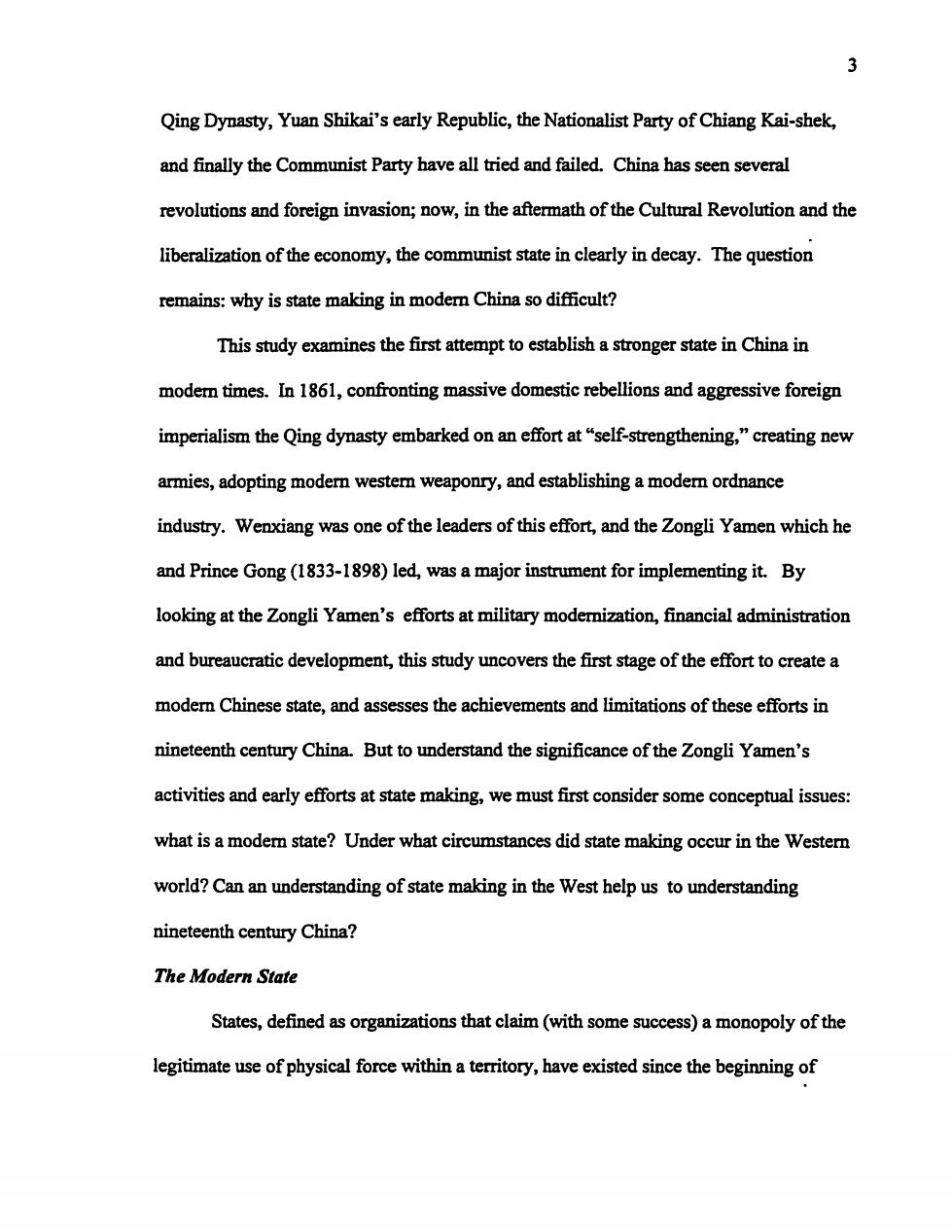
Contents Introduction:State Making in Nineteenth Century China 1 Chapter 1:Crisis,Coup D'Etat,and The Creation of the Zongli Yamen 34 Chapter 2:The Zongli Yamen and the Qing Bureaucracy 61 Chapter 3:War,Politics and the Late Qing State:The Zongli Yamen and the Firearms Division 133 Chapter 4:The Zongli Yamen,the Maritime Customs,and Late Qing Finance 188 Chapter 5:Bureaucracy,Knowledge,and the State:The Zongli Yamen and the Investigation of Foreign Matters 249 Chapter 6:Politics and the Limits of State Making:The Zongli Yamen and the Crisis of the 1870s 298 Conclusion 340
Contents Introduction: State Making in N'meteenth Century China 1 Chapter 1: Crisis, Coup D'Etat, and The Creation oftheZongli Yamen 34 Chapter 2: The Zongli Yamen and the Qing Bureaucracy 61 Chapter 3: War, Politics and the Late Qing State: The Zongli Yamen and the Firearms Division 13 3 Chapter 4: The Zongli Yamen, the Maritime Customs, and Late Qing Finance 188 Chapter 5: Bureaucracy, Knowledge, and the State: The Zongli Yamen and the Investigation of Foreign Matters 249 Chapter 6: Politics and the Limits of State Making: The Zongli Yamen and the Crisis of the 1870s 298 Conclusion 340

Abbreviations Used in the Footnotes Archives DY:Zhongguo di yi lishi dang'an guan,The First National Historical Archives F.O.:British Foreign Office (from the Public Records Office) HJ:Journal of Robert Hart,Queens University,Belfast. NPM:National Palace Museum Taipei ZSZD:Zongshu zoudi,manuscript copies of memorials from the Zongli Yamen,Beijing Library ZY:The Zongli Yamen archives,Institute of Modern History,Academia Sinica,Taiwan. Published Collections of Documents DQHD:Da Oing huidian:Statutes of the Qing Dynasty DXTG:Dao Xian Tong Guang sichao zouyi (deliberative memorials from the Daoguang, Xianfeng,Tongzhi,and Guanxu periods) HDSL:Da Oing huidian shili (Precedents to the Qing Statutes) HFD:Haifang dang (Maritime defense files).Taipei,Institute of Modern History,1957. QSG:Qing shi gao,Draft History of the Qing Dynasty QSL:Qing shi lu:Veritable Records of the Qing Dynasty renshi ziliao:Jindai zhongguo dui xifang ji lie qiang renshi ziliao huibian SGXD:Siguo xindang (New files on the four countries),Taipei,Institute of Modern History,1966 YWSM-TZ:Chouban yiwu shimo,tongzhi chao (Taipei reprint,Wenhai,1970) YWSM-XF:Chouban yiwu shimo,Xianfeng chao,(Beijing:Zhonghua shuju,1980) YWYD:Yangwu yundong,8 vols,(Beijing,1960) ZJHS:Tang Xianglong,Zhongguo jindai haiguan shuishou he fenji
Abbreviations Used in the Footnotes Archives DY: Zhongguo di yi Iishi dang'an guan, The First National Historical Archives F.O.: British Foreign Office (from the Public Records Office) IU: Journal of Robert Hart, Queens University, Belfast. NPM: National Palace Museum Taipei ZSZD: Zongshu zoudi, manuscript copies of memorials from the Zongli Yamen, Beijing Library Z¥: The Zongli Yamen archives, Institute of Modem History, Academia Sinica, Taiwan. Published CoUections of Documents DQHD: Da Qing huidian: Statutes of the Qing Dynasty DXTG: Dao Xian Tong Guang sichao zouyi (dehoerative memorials from the Daoguang, Xianfeng, Ton~ and Guanxu periods) HDSL: Da Qing huidian shili (precedents to the Qing Statutes) HFD: Haijangdang(Maritime defense files). Taipe~ Institute of Modem History, 1957. QSG: Qing shi gao, Draft History of the Qing Dynasty QSL: Qing shi lu: Veritable Records of the Qing Dynasty renshi ziliao: Jindai zhongguo dui xiJangji lie qiang renshi ziliao huihian SGXO: Siguo rindang (New files on the four countries), Taipei, Institute of Modem History, 1966 YWSM-TZ: Chouhan yiwu shimo, tongzhi chao (Taipei reprint, We. 1970) YWSM-XF: Chouhanyiwu shimo, Xianfengchao, (Beijing: Zhonghua shuju, 1980) YWYD: Yangwu yundong, 8 vols, (Beijing, 1960) ZJHS: Tang Xianglong, Zhongguo jindai haiguan shuishou he fenji

Introduction: State Making in Nineteenth Century China In the winter of 1874-5,the veteran Manchu statesman Wenxiang(1818-1876) submitted to the throne a remarkable memorial.As the leading member of the Zongli Yamen,the bureau of foreign affairs for the preceding thirteen years,Wenxiang had attempted to direct the Qing Dynasty toward a more peaceful and productive foreign policy,and to press for a program of self-strengthening.But now,seriously ill with respiratory disease,he found little to be proud of.His government had been battling internal rebellions for twenty-five years,but fighting continued in the Northwest,and now China faced a host of foreign antagonists.Britain,France,Russia and even Japan eyed the Qing dominions hungrily.As the recent crisis with Japan concerning sovereignty over Taiwan showed,the challenge they posed could not be avoided for long. Casting a cold eye on those who denied that China had anything of substance to learn from foreigners,Wenxiang remarked: There are those who say that the nature of the western countries is like dogs and sheep,and they do not know about government.But in these countries when there is a matter that calls for action,the ruler sends it to the upper house of parliament for deliberation,that is what is meant by 'consulting with the officials and scholars;'he [also]sends it to the lower house of parliament,that is what is meant by'consulting with the common people.What is deliberated upon and can be done is then implemented;if not,then it is stopped.Everything must be in accord with the feelings of the people ...These countries govern themselves by means of these principles and they regard the rising and falling and successes and failures of other countries by these [criteria]. The quotations are from the canonical Book ofDocumens V,iv.See James Legge,The Chinese Classics,(Hong Kong:Hong Kong University Press,1960),vol.3,337
Introduction: State Making in Nineteenth Century China In the winter of 1874-5, the veteran Manchu statesman Wenxiang (1818-18~6) submitted to the throne a remarkable memorial. As the leading member of the Zongli Yamen, the bureau of foreign affairs for the preceding thirteen years, Wenxiang had attempted to direct the Qing Dynasty toward a more peaceful and productive foreign policy, and to press for a program of self-strengthening. But now, seriously ill with respiratory disease, he found little to be proud of. His government had been battling internal rebellions for twenty-five years, but fighting continued in the Northwest, and now China faced a host of foreign antagonists. Britain, France, Russia and even Japan eyed the Qing dominions hungrily. As the recent crisis with Japan concerning sovereignty over Taiwan showed, the challenge they posed could not be avoided for long. Casting a cold eye on those who denied that China had anything of substance to learn from foreigners, Wenxiang remarked: There are those who say that the nature of the western countries is like dogs and sheep, and they do not know about government. But in these countries when there is a matter that calIs for action, the ruler sends it to the upper house of parliament for deliberation, that is what is meant by 'consulting with the officials and scholars;' he [also] sends it to the lower house of parliament, that is what is meant by 'consulting with the common people.' I What is deliberated upon and can be done is then implemented; if not, then it is stopped. Everything must be in accord with the feelings of the people ... These countries govern themselves by means of these principles and they regard the rising and falling and successes and failures of other countries by these [criteria]. I The quotations are from the canonical Book a/Documents V, iv. See James Legge, The . Chinese Classics, (Hong Kong: Hong Kong University Press, 1960), vol. 3, 337

To Wenxiang western states with their parliaments were admirable not for their ideals, but for their ability to promote national unity and competitiveness.Wenxiang's praise of western representative government was at the same time a critique of the defects of the Qing state.While he felt that in the current situation,adopting the parliamentary system would be difficult,the Qing could"pick out what is right;"particularly the concern for the feelings of the people,and consulting with elites.He knew from long experience that China's weakness was not merely the result of the inferior technology of its weapons, but the inability of the state to mobilize resources,to maintain the loyalty of so many men in an age of rebellion,to persuade even its elites to act in the public interest,and the incapacity of statesmen to make the hard decisions needed to transform the system. Twenty years before his peers,Wenxiang understood that the western states that oppressed China were something unique in history:political organizations able to mobilize resources and wield power on an unprecedented scale.China needed to respond in unprecedented ways,Wenxiang hinted,perhaps even adopt some of the methods and institutions of countries so many Qing officials ostentatiously despised. One hundred and twenty years later,Wenxiang's comments still resonate.One of the central problems China has faced in modern times is the development of an effective state,able to maintain domestic order,resist foreign aggressors,feed a huge and growing population,and promote economic growth.Ever since internal rebellions and Western imperialism rocked the Qing empire in the mid-nineteenth century,successive regimes have attempted to create in China the kind of national state that dominated Europe.The Qing shi gao,[hereafter QSG](Beijing:Zhonghua shuju,1977),vol.38,11691
2 To Wenxiang western states with their parliaments were admirable not for their ideals, but for their ability to promote national unity and competitiveness. Wenxiang's praise of western representative government was at the same time a critique of the defects of the Qing state. While he felt that in the current situation, adopting the parliamentary system would be difficult, the Qing could '1>ick out what is right;" particularly the concern for the feelings of the people, and consulting with elites.2 He knew from long experience that China's weakness was not merely the result of the inferior technology of its weapons, but the inability of the state to mobilize resources, to maintain the loyalty of so many men in an age of rebellion, to persuade even its elites to act in the public interest, and the incapacity of statesmen to make the hard decisions needed to transform the system. Twenty years before his peers, Wenxiang understood that the western states that oppressed China were something unique in history: political organizations able to mobilize resources and wield power on an unprecedented scale. China needed to respond in unprecedented ways, Wenxiang hinted, perhaps even adopt some of the methods and institutions of countries so many Qing officials ostentatiously despised. One hundred and twenty years later, Wenxiang's comments still resonate. One of the central problems China has faced in modem times is the development of an effective state, able to maintain domestic order, resist foreign aggressors, feed a huge and growing population, and promote economic growth. Ever since internal rebellions and Western imperialism rocked the Qing empire in the mid-nineteenth century, successive regimes have attempted to create in China the kind of national state that dominated Europe. The 2 Qing shi gao, [hereafter QSG] (Beijing: Zhonghua shuju, 1977), vol. 38, 11691

3 Qing Dynasty,Yuan Shikai's early Republic,the Nationalist Party of Chiang Kai-shek, and finally the Communist Party have all tried and failed.China has seen several revolutions and foreign invasion;now,in the aftermath of the Cultural Revolution and the liberalization of the economy,the communist state in clearly in decay.The question remains:why is state making in modern China so difficult? This study examines the first attempt to establish a stronger state in China in modemn times.In 1861,confronting massive domestic rebellions and aggressive foreign imperialism the Qing dynasty embarked on an effort at"self-strengthening,"creating new armies,adopting modern western weaponry,and establishing a modern ordnance industry.Wenxiang was one of the leaders of this effort,and the Zongli Yamen which he and Prince Gong(1833-1898)led,was a major instrument for implementing it.By looking at the Zongli Yamen's efforts at military modernization,financial administration and bureaucratic development,this study uncovers the first stage of the effort to create a modern Chinese state,and assesses the achievements and limitations of these efforts in nineteenth century China.But to understand the significance of the Zongli Yamen's activities and early efforts at state making,we must first consider some conceptual issues: what is a modern state?Under what circumstances did state making occur in the Western world?Can an understanding of state making in the West help us to understanding nineteenth century China? The Modern State States,defined as organizations that claim (with some success)a monopoly of the legitimate use of physical force within a territory,have existed since the beginning of
3 Qing Dynasty, Yuan Shikai's early Republic, the Nationalist Party of Chiang Kai-shek, and finally the Communist Party have all tried and failed. China has seen several revolutions and foreign invasion; now, in the aftermath of the Cultural Revolution and the . liberalization of the economy,. the communist state in clearly in decay. The question remains: why is state making in modem China so difficult? This study examines the first attempt to establish a stronger state in China in modem times. In 1861,. confronting massive domestic rebellions and aggressive foreign imperialism the Qing dynasty embarked on an effort at "self-strengthening," creating new armies, adopting modem western weaponry, and establishing a modem ordnance industry. Wenxiang was one of the leaders of this effort, and the Zongli Yamen which he and Prince Gong (1833-1898) led, was a major instrument for implementing it. By looking at the Zongli Yamen's efforts at military modernization, financial administration and bureaucratic development,. this study uncovers the first stage of the effort to create a modem Chinese state, and assesses the achievements and limitations of these efforts in nineteenth century China. But to understand the significance of the Zongli Yamen's activities and early efforts at state making, we must first consider some conceptual issues: what is a modem state? Under what circumstances did state making occur in the Western world? Can an understanding of state making in the West help us to understanding nineteenth century China? The Modem State States, defined as organizations that claim (with some success) a monopoly of the legitimate use ofphysica1 force within a territory, have existed since the beginning of